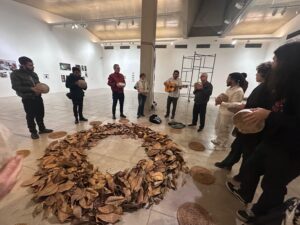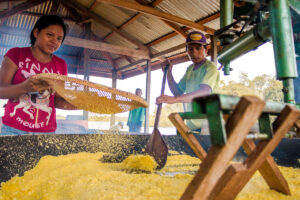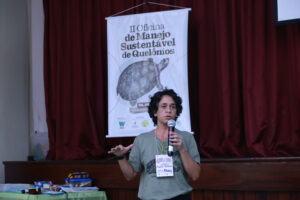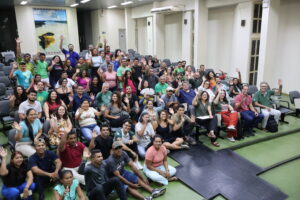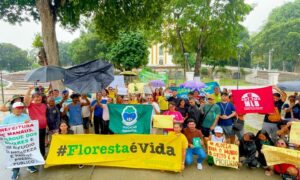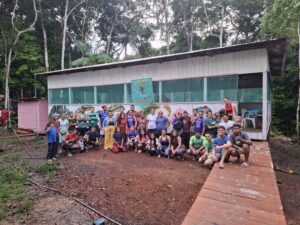By Daniela França
I am a scientist, environmental consultant, scientific disseminator, activist and mother. I earned this space to talk about motherhood and science in a country where a man hits with one hand, and yet with the other offers flowers in the Month of Women. Maybe I didn’t win the space, but I did overcome challenges, because I had the courage to expose ideas like the ones I have been describing on social networks and in other discussion spaces for some time. These are not new ideas, as the feminist struggle has been around for more than a century. Many colleagues do not face this fear of speaking and exposing themselves, for fear of having their careers boycotted or because they already know that the fight for women’s rights has always been and still is denigrated as resulting from a “lack of sex”. It is a real challenge because, even today, women get sick or are killed – victims of the system that stones them, tramples on them. If you think I am exaggerating, just remember how many were trampled on when wanting to leave the house to work, or when fighting for the right to have children, to vote, to study or just… never get beaten up by your partner. In order to gain their independence, women have historically been torn from themselves and killed, often by those who claim to love them.
It was less than five years ago, after my second birth, that I realized that the way that my colleagues, both men and women, called me “Wonder Woman” was, in fact, the way society had found to exalt women – mostly mothers – who had resisted more time without collapsing, without succumbing, without giving up, in the face of the trampling that the patriarchy imposes on us since we are understood as girls. It was in the pandemic that the kicks got even stronger and started to hurt more, as if they hit the middle of the face. Yes, we are trampled. Recalling that, despite having humble origins, I still speak of my privilege as a white woman, cis, with no disabilities and being part of a very small portion of the Brazilian population that holds a doctoral degree. If I am trampled, there are women being trampled with much more force, and it is necessary to speak of that. Even so, in many moments, the wonder woman who lives somewhere here, inside me, thought about giving up, and it was not just once.
Give up, give up, give up, give up, give up…
The word that echoes during the life and career of those who chose to be scientists, a profession that, according to the stereotype injected by the system, does not belong to delicate, emotional, maternal beings… maternal! It is up to us to care, not to act; welcoming, not assertiveness; emotion, not precision. Scientist mothers have disapproving looks in environments where getting pregnant seems to be synonymous with having committed the most serious sin in the eyes of God (who, by the way, is not a goddess): professional suicide. It is unusual for a woman to choose to be a mother before reaching the top of her career because predatory customs in academic productivity devour those who do not follow the pattern imposed by them. Care is delegated to the woman. The less possessions she has, the more housework she needs to do, the more care she provides. Meanwhile, the father, also a scientist or any worker, understands that it is his duty to take care of the home, child(ren), and elderly or sick relatives, while he publishes his articles, attends his congresses, conducts his life, earns his prizes and rewards. It is as if marriage is a factory and the husband is the owner of the factory, which he enriches at the expense of his wife’s work, and the woman/mother is just the worker who works to enrich the boss. And then a phrase comes to mind that has many variants out there: “behind every warrior woman there is a man who neglects his family” or “behind an exhausted scientist mother, there is a father with a Nobel Prize”.
Even today the subject that I bring here is delegitimized. Perhaps even unconsciously they make women believe that they should choose a career or motherhood as if they were not allowed to have both, because “who gave birth, must look after!”. After all, women are parthenogenetic beings who breed alone. Well, dear readers, my words seem angry and revanchist, but it’s just exhaustion. In fact, my wish for this Women’s Month of 2021 – when a pandemic scrapes even more the social, racial and gender inequalities that exist in this country – is for them to exchange their flowers for responsibility! Science must be diverse and the whole society is responsible for our children, not just the mother. Contrary to what most people think, it is not motherhood that has negative impacts on the careers of scientists, but the lack of actions and public policies that generate different opportunities for different citizens and our difficulty in recognizing our responsibilities. Science is collaborative and raising children is a science, my people! Take your flowers, here!
–
Daniella Pereira Fagundes de França, or simply Dani Moojeni, is a biologist, PhD in Zoology and holds a postdoctoral position in the Herpetology laboratory at the Zoology Museum at USP (University of São Paulo). She is a scientific disseminator and environmental educator through the @herpetosegundoherpetologas initiative. She is a managing partner at BioRevita Soluções Ambientais and an ambassador for the @parentinscience project which promotes the discussion of maternity/paternity in science. She always says that she is a teacher by training, passion and choice, and usually says that the most important production in her career are her children Ernesto and Paulinha.

